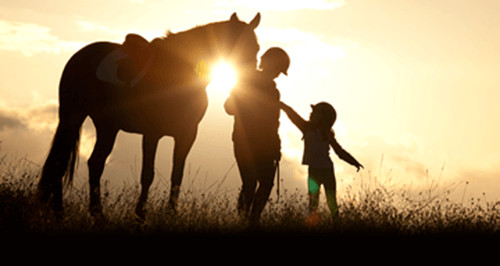Boundless Ranch: What do you need to know to choose the perfect off-road horse?
Choosing a horse for cross-country riding is not an easy process because there are several factors that must be carefully considered. After all, it's about deciding which horse is suitable for a particular rider, and it's just the beginning of creating the "perfect" off-road horse for that rider.
When someone wants to ask for advice on choosing a cross-country horse, they should first ask them three important questions:
1. What path will they ride on?
Tough mountain trails, short leisurely flat rides or long day trips are all very different and require different horse qualities. Therefore, the horse should first match the rider's purpose. For example, a harsh mountain path requires a particularly healthy and healthy animal. But a not-so-able-bodied old horse might be suitable for the occasional day trip on the easy trail.
2. What kind of energy and speed do they prefer?
When needed, it is recommended to find a horse that can cover the ground quickly and safely. If a rider wants to move around quickly, a lazy horse, or a horse that likes to walk slowly, can be frustrating.
3. Finally, does he or she like to stop often on the trail to talk to other riders?
If that's important, then a quiet horse with "interrupted chat" is best for that rider. Riders who like to jog and stop to admire the natural beauty of the trail are best for slow and quiet horses.
Views on defining an ideal horse are as diverse as people. In the end, it's all about matching the needs and personalities of the horse and rider. One thing I worry about is that when a horse owner loves his or her animal, many of the points I mentioned above are ignored and are often detrimental to both the horse and the rider.

When the rider understands the horse's personality,"fit" is even better. Horses have a personal personality, just like people. This is part of the beauty of this animal and has an influence on the rider's choice of specific off-road horses. My advice on choosing a horse for mountain trail riders is to make sure the animal is confident, bold and quiet. In addition, it must be trained to think independently. Thinking alone means that horses have been evaluated for trail obstacles and how to drive them safely while minimizing rider interference. It places its feet instinctively and draws a path through obstacles, guided only by the rider's slight leg and hand hints. Mountain trail horses should sail easily through rocks, logs and water without panic. This is achieved through good training on mountain trail courses. Good training is crucial because most mountain trails have such natural obstacles and can be very dangerous for untrained horses.
Good training leads to a horse that builds a partnership with the rider. This means that animals will not attack obstacles in command. Instead, through subtle clues, it knows what the rider is asking and then thinks about how to navigate while the rider manages every step. This is important because, for example, when a horse is trapped in bushes or logs, it feels a strong urge to escape and often panicked. But a well-trained horse will consider the option of going out. Of course, the overriding thing is safety; a well-trained horse is a safe horse, and there is no substitute for it.
The boldness and confidence of well-trained cross-country horses make riding a pleasure because riders don't have to worry about what the animal is willing and able to do. When the horse meets the rider's needs and wishes, properly trains the trail, and forms partnerships that are critical to challenging obstacles, the rider's perfect off-road horse is achieved.
Next Article:Beijing Tianjin Six-Day Tour Beijing
